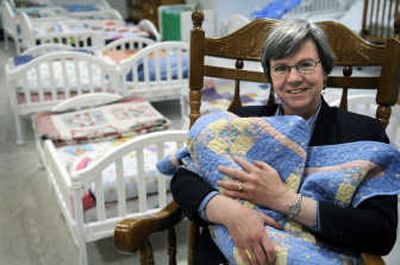Exemplifying volunteer virtues

Wall paintings of a toddler-size Winnie the Pooh alongside his friends Eeyore and Owl are among the official greeters at Vanessa Behan Crisis Nursery. Follow them down the cheerful hallway and you’ll get to a little room filled with cubbies. That’s where children leave their shoes and any toys they brought along. If there’s a favorite “blankie” for sleep time, it’s kept here as well.
The children arrive at Vanessa Behan for many reasons: maybe a single parent needs a break; perhaps there are medical issues at home and the child can’t go along to the hospital; or the family was evicted and there’s nowhere for the child to stay until new housing is found.
Last year 3,963 children came through the nursery’s doors to be greeted by staff and by volunteers like Teresa Venne.
For 12 years Venne has been a staple at the nursery, and in January she received the Bill Bialkowsky Founder’s Award for her service. Not that she wants to discuss that – she’d much rather talk about the kids she’s helped care for over the years.
“Some years ago I was between jobs and had some extra time, and there was a boy here who really needed someone,” said Venne. “He was 16-18 months old, living with his grandmother, and he had some medical issues. He couldn’t sit up, couldn’t roll over, couldn’t do what children usually can at that age – yet he was normal size.”
It was a problem during childbirth that caused the disability.
“His grandmother was very concerned about having other people take care of him,” Venne said. “In the beginning I was just there when he came in and I’d take care of him. Later she’d call to hear if I was there, and then bring him in. I learned some physical therapy exercises to do with him.”
It’s unusual for volunteers to develop a close relationship with one child, but in this case Venne said it made perfect sense because the little boy couldn’t be left alone.
“Normally volunteers don’t know what’s going on with the families or with the kids,” said Venne. “But yes, he was pretty special.”
Amy Swanson, executive director of Vanessa Behan, remembers that time.
“The grandmother didn’t have much of a support system,” Swanson said. “We are not set up to care for medically frail children, but this is a great example of how our staff thinks outside of the box: Teresa found a way to make this work.”
Staff and volunteers are not allowed to develop personal relationships with the children or their families outside of the nursery.
“At the time, I think Teresa was doing some temp work, and when the grandmother called we’d call Teresa. She’d come here instead of going to her paid position,” said Swanson. “I think that is just huge. I mean, we know that stress is the number one indicator of child abuse and neglect. Don’t tell me that families with special needs children don’t have a high level of stress.”
At the nursery, things follow a daily rhythm with breakfast and tooth-brushing, baths, snack time, naps and playtime outside. Children arrive and leave at different times every day so it can be a busy environment, but staff and volunteers do their best to make it predictable, Venne said.
Once the children make it through the intake process, whatever chaos is going on at home is left outside the door.
“I think it’s good not to know what’s going on at home,” Venne said. “We help the children right here in the moment. I’d say most of them have a good experience: They are clean, warm and safe.”
Born in Seattle, Venne, 58, attended Gonzaga University, where she met her husband, Chris. After spending time in Arizona, the couple returned for Expo ‘74.
“We had Pinnacle Productions and did some video production for Expo,” Venne said. “I guess we just never left Spokane again.” The couple have two grown daughters; Chris Venne is development finance manager for Community Frameworks, an organization that seeks to provide affordable housing solutions.
Teresa Venne’s background is accounting.
“It was through accounting that I got into human resources work. I was the benefits manager at Sterling Bank. That’s where I really got into helping people,” she said.
In an effort to care for more children, Vanessa Behan started the certified house parent program three years ago.
“Teresa was our first certified house parent,” said Swanson. “House parents go through the same training as our staff, and they have the same responsibilities and can do the same work – but we obviously don’t pay them.”
For every certified house parent, the nursery can take in four more children until it reaches its limit of 23.
Last year Venne took an AmeriCorps position with Vanessa Behan, coordinating, training and background-checking volunteers. She had one condition, though: “She told us she would only take the position if she could keep one full day with the children in the nursery,” said Swanson. “So we let her have that.”
The need for emergency child care is huge. In February, Vanessa Behan turned away 200 children because the nursery was full. Now the daily intake process has turned into triage, assessing the families who call, trying to figure out how to best apply the limited resources available.
“We try to make sure and ask the parents who come here if they need anything else,” said Venne. “Do they need housing? Diapers? Formula? We try to make sure they are OK going home.”
As with everyone else there, Venne worries that so many children are turned away.
“It’s often the babies we can’t take,” she said. “We do see some of the same families all the time, even though we’d like to think we see them less. In some ways the need may seem greater – or maybe it’s just that more people know about us now.”